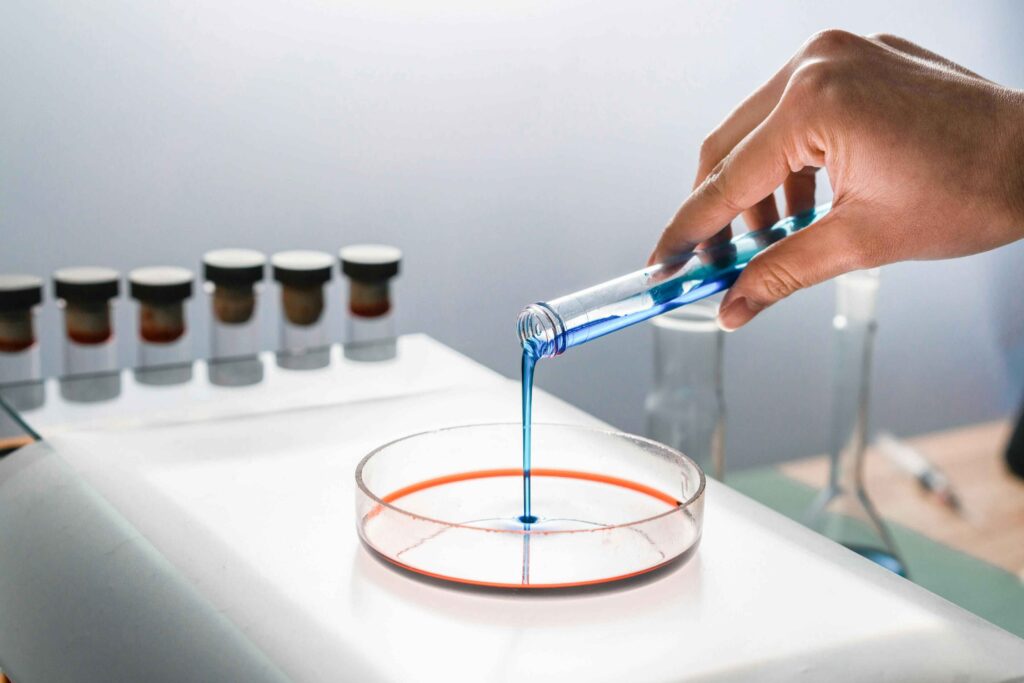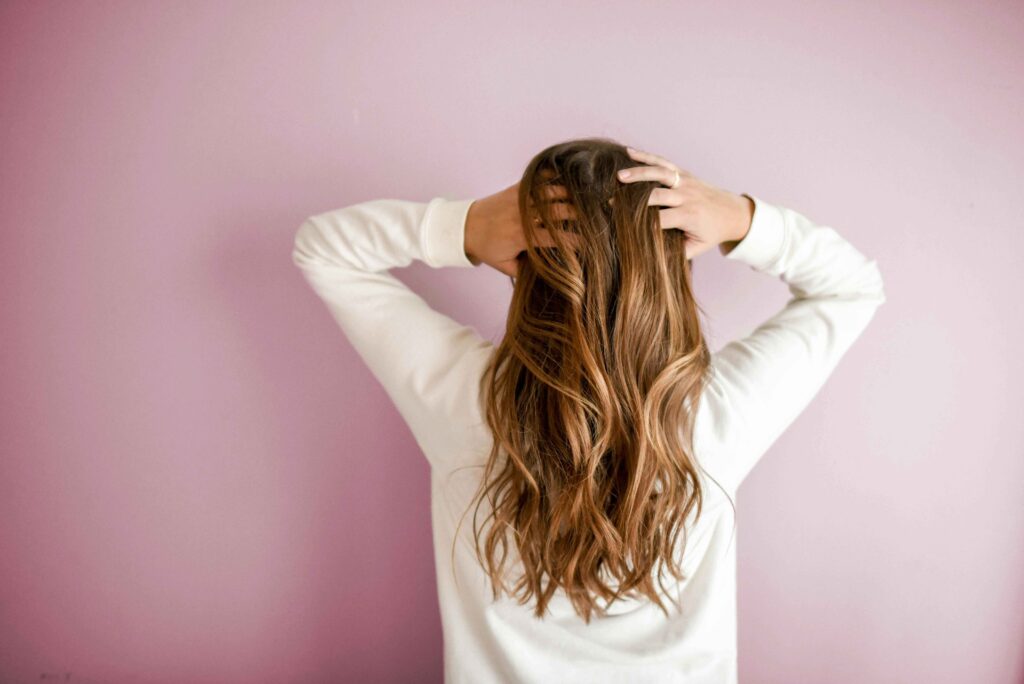From all of the hydrating products out there Hydrated, you’d think the answer is obviously yes. But is it all a lie? There’s quite a lot of hair experts, including scientists, who say that water is bad for your hair, it causes damage. But that’s not really true either.
Understanding Hair and Water
Water and hydration is one of the most confusing topics in hair science. It’s one of the biggest sources of hair myths, not just from marketing and regular people, but also hair experts and cosmetic scientists. But once you understand it better, a lot of things about your hair and how to take care of it will start to make a lot more sense.
The Science Behind Hair and Water
Have you ever noticed that when your hair is wet, it’s stretchier? If you have long hair, it’s probably pretty obvious. If you don’t, ask a friend for a few pieces to play with. Dry hair is stiffer, if you stretch it too much, it breaks, it doesn’t spring back. Wet hair is bendier, it’s easier to stretch, but if it stretches, it will spring back.
The Structure of Hair
That’s because the inside of your hair is really sensitive to water. Your hair is made of proteins, and all of this protein is stuck together with bonds. Bonds give your hair its strength and its shape. There are permanent bonds that only really break with chemical treatments, but there are also lots of temporary bonds, mostly hydrogen bonds. Water is really good at breaking these.
How Water Affects Hair
When your hair is dry, these temporary bonds are sticking proteins to each other like glue. They are holding hands at a molecular level. But proteins can also hold hands with water. So, if you dump a whole bunch of water into your hair, the proteins will start bonding with the water instead of bonding with each other.
The Myth of Hydrating Hair Products
If you go to the store, you’ll see tons of products that say hydration, hydrating. So, you’d think it’s really obvious, more water in your hair makes your hair feel nice, soft, smooth, healthy. And this is one of the weirdest things that the whole hair care industry has kind of just agreed to do.
The Truth About Hydrating Hair Products
There is a sweet spot when it comes to how hydrated your hair should be. It’s actually not that much different from skin. When your skin is too wet, if you’ve been sitting in the bath for ages, it gets fragile and might crumble easily. But on the flip side, if it’s too dry, then it’s stiff and it cracks.
The Difference Between Hair and Skin
But there are two big differences. Number one, it’s a lot harder to adjust the level in hair with just products. And number two, the sweet spot for hydration with hair is a lot lower than it is for skin.
The Science Behind Hair Hydration
Here’s the thing, in studies, hair that feels nice and soft and smooth and healthy, and what we would think of as hydrated, it actually has less water than hair that feels rough and dry and damaged.

Why Hair with Less Water Feels Nicer
So, why does hair with less water feel nicer? But then, your hair feels nicer when you wash it, and when you use so-called hydrating products? Let’s start with the first bit, why hair with more water feels worse.
The Role of Bonds in Hair
When you have extra water/puppies in the hair, it starts swelling up, and different parts of your hair will swell up different amounts. It’s like the puppies like hanging out in particular bits. If we zoom into the cuticle scales on the surface of your hair, those are those overlapping roof tiles. The underneath of each scale and the glue in between the scales will absorb water a lot more than the top. So, the scales stick up a lot more, the surface feels bumpier and rougher.
The Role of Surface Tension
Water itself is also sticky. If you have one of those grocery bags, and you can’t open it, you can wet your fingers a little bit, not too much, and get more grip. So, when the hair has more water in it (and on it), the surface gets bumpier and grippier on a microscopic level, and to us, that makes it feel like it’s dry.
The Myth of Hair Porosity
There are a couple of tests that seem to show that hair porosity is a thing. One of them is the hair porosity test. You put a strand of hair in water, if it’s less damaged, it floats. People will say it’s ‘less porous’. But if it’s more damaged, and it sinks, then it is ‘more porous’. So, if it’s not about water

- The Myth of Hair Porosity
- So, if it’s not about water absorbing into hair, what exactly is happening? Well, this is actually all about surface tension. It’s happening because of how water is clinging to the outside of the hair, not whether or not it gets inside. The way most people explain the strand test is that hair sinks when it’s absorbed enough water, so if it’s more porous, more holes, the water gets in faster, and it sinks. But the thing is, hair is already denser than water. You can actually do a similar test with a paperclip. If you’re careful, you can get it to float on water, even though metal is denser. It should sink, if it was causing the bulges they saw in that one little sample of hair, then other studies would be seeing a lot more bulges.
- The Role of Surface Tension in Hair
- So, both hair and the paperclip are dense enough to drop down already. They’ll sink if you disrupt the surface tension. In a glass, the water molecules, which are the blue blobs, they really like holding hands with each other. The ones at the top don’t have friends on top, so it’s like they have extra hands that have to grab along the surface. And all this bonding, all this grabbing, forms a sort of strong skin that can hold things up, like hair and paper clips. Normally, the oily F layer doesn’t like water, it’s not going to hold hands with it. But if you get rid of it, then you have a surface that actually likes water, it can hold hands. So, the water molecules at the top hold hands with the hair, and so you get less of that surface tension. You don’t have a skin, the hair sinks.
- The Misconception of Hygral Fatigue
- Now, you might be thinking, isn’t this wetting and drying over and over again bad for your hair? This is a really persistent myth called hygral fatigue. It’s really ingrained everywhere. But there actually isn’t that much convincing evidence that hygral fatigue is actually a thing. The analogy I see is that wetting and drying your hair is like stretching a rubber band. You do not want to wet your hair every day, because if you are constantly wetting it and drying it and wetting it and drying it, it will eventually snap. But for rubber bands, it’s because you’re stretching it so much that you’re breaking permanent bonds. They can’t actually form again.
- The Reality of Hair and Water
- In hair, water is breaking temporary hydrogen bonds. These ones will reform really easily. So, it’s actually a lot more like joining and unjoining Lego pieces, and not the knockoff Lego, the proper brand name ones. Except the atoms and hydrogen bonds are way more durable. The electrons and protons never wear out. Wet hair is more fragile, though. So, you do have more opportunity for it to get damaged if you’re rough with it. But just having water going in and out isn’t going to cause damage.
- The Science Behind Hair Care Products
- There are a couple of papers that seem to say that hygral fatigue is a thing, water itself can damage hair. But they aren’t very good evidence. The first one is this study on hair drying. I talked about it in my hair drying video. The researchers concluded that air drying caused damage because water was swelling the hair for longer. But I don’t think that explanation actually makes sense. Air drying is pretty standard everywhere. If it was causing the bulges they saw in that one little sample of hair, then other studies would be seeing a lot more bulges your hairs, healthy. You can contact us here.

The Truth About Coconut Oil
So, the bulges probably come from something else that happened to that specific sample. There are also a few studies on coconut oil that said it could potentially block water from absorbing, so it protects against hygral fatigue. But they don’t actually cite sources for hygral fatigue being a problem in the first place. With coconut oil, a lot of people, including me in the past, have cited this study as a reason for why it might be good to use before shampooing.
But another hair scientist, Trefor Evans, thinks this might essentially be a calculation error in the experiment. They put different oils on hair and then let them absorb water. The weight of the coconut oily hair didn’t increase as much. But it looks like they didn’t take the weight of the coconut oil into account. So, the same amount of absorbed water would look smaller as a percentage. You are dividing by a bigger number.
The Reality of Hair Hydration
And coconut oil not sealing out that much water, this makes sense with hair structure. Every cuticle edge is a gap. It’s just really unlikely that you could seal the whole pine cone against teeny tiny water molecules. And this is the case in general for hair products.
And this is the case in general for hair products. It is just really hard to prevent tiny water molecules going in and out of your hair. The water content of your hair largely just depends on relative humidity, how much water is actually in the air around you.
The Effects of Humidity on Hair
We already talked about how hair is weaker and rougher when it’s wet, and this is also the case when humidity is high, just to a lesser extent. But having too little water also causes a bunch of other changes. If humidity is really low, your hair is too dry, and static builds up really easily. You get flyaways. That’s because hair loses electrons when it rubs against stuff, but water can help spread that static charge out.
The Importance of Finding a Balance
So, I always notice that my hair goes really staticky and awful on planes. The humidity there is just ridiculously low. Hair that’s too dry is also more brittle, and this means it isn’t stretchy and flexible enough. You want a little bit of flex because that absorbs shock. This is important when you are putting force on it, when you’re brushing it. Dry hair cracks more easily, including inside the hair, and when the cracks build up enough, that’s when your hair breaks.
The Similarity to Nails
This also happens with nails. If you clip your nails when they’re dry, the cracks will keep traveling because the nails are more brittle. But if you do it after a shower, they’re more wet, they’re more flexible, the cracks will stop, they don’t spread the whole way.
Finding the Happy Medium
So, how do you get your hair into that sort of happy medium of hydration? Well, there are a few things that can help, or at least they can make your hair act like it has a more ideal water content. How exactly some of these things work isn’t really settled. Bonding treatments, I know I need to do a proper video on these, a lot of them seem to work by sitting in your hair and stopping water from coming in and breaking a whole bunch of bonds.
The Role of Humectants
Small molecules like glycerin might be able to get into hair and act like water, or it could be potentially increasing humidity right next to the hair. There’s a study that found that black hair at 65% humidity broke more easily than wet hair, and using humectant like glycerin stopped that from happening.
The Benefits of Oils
Oils like coconut oil, the reason they might work is that they get into hair a bit, and then they make it more flexible and less brittle. So, at the end of all of that, water isn’t actually good or bad. It is a tool. It can be used to basically soften hair structure, whether that is good or bad depends on your hair and what you’re trying to do to it.
If you want hair that feels smooth and soft and well, cold, you probably want to condition it and shape it so that it is smoother and the strands are more aligned. It doesn’t actually matter if your product actually says hydrating. You don’t need to worry too much about the hydration part.
What is Hospital Indemnity Insurance? – Wellflick.com
What is an EVS Manager at a Hospital? – Wellflick.com


